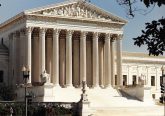Supreme Court Justice Alito: faith ‘should affect the way you treat people’ as a judge
Washington, D.C. Newsroom, Sep 28, 2022 / 16:45 pm
Supreme Court Justice Samuel Alito — author of the deciding opinion that overturned Roe v. Wade — stressed the importance of his Catholic faith to serving on the highest court in the country Tuesday in a lecture to law students at the Catholic University of America (CUA).
“A person’s faith shapes what kind of person [he or she] is,” Alito said, adding “it also should affect the way you treat [people] when you’re serving as a judge.”
Alito’s inaugural lecture was given at the opening of CUA’s new Project on Constitutional Originalism and the Catholic Intellectual Tradition (CIT), a program started for students at the university’s Columbus School of Law.
CIT explores the relationship of Catholicism to American Constitutionalism, focusing on doctors of the church such as Sts. Augustine and Thomas Aquinas and secular thinkers such as Aristotle and Cicero.
Professor J. Joel Alicea, who co-directs the program, said in the lecture’s opening statement that the school believes the Catholic intellectual tradition “can help us better think through the challenges of our day.”
Alicea, who clerked for Justice Alito in 2016, introduced the justice as the honorary chair of the project’s advisory board to the reception of thundering applause.
The justice then gave remarks outlining how CUA’s project will consider how the Catholic faith relates to law but did not address the overturning of Roe or other controversial opinions from the summer.
When asked by a student how his personal faith affected his professional life, Alito pointed to how formative Catholicism is in shaping how a person treats other human beings.
“Among other things, [faith] shapes how a person regards other people and treats other people,” Alito responded.
“Judges affect people — indirectly, but sometimes very powerfully, through their decisions,” he continued. “It’s important to keep in mind that these decisions are not just abstract discussions. They have a real impact in the world and you have to keep that in mind.”
Alito authored the historic Dobbs v. Jackson Women’s Health Organization Supreme Court decision that overturned Roe v. Wade in June.
“Roe was … egregiously wrong and on a collision course with the Constitution from the day it was decided,” Alito wrote in the decision’s opinion.
The decision denounced the claim that there is a “constitutional right to abortion” and returned the question of it to the states.
“Abortion presents a profound moral question,” the opinion concluded.
The son of Italian immigrants, Alito was born to a Catholic family in Trenton, New Jersey. He was a graduate of Princeton University and Yale Law School. After serving in positions for the Justice Department and as the U.S. attorney general for the district of New Jersey, he was nominated to the Supreme Court by President George W. Bush — a position he’s held since 2006.
Following this summer’s landmark decision overturning Roe, Alito and the other justices have faced virulent criticism both nationally and abroad, increased violence, and even death threats.
Alito dismissed some of these attacks in a speech at a Notre Dame conference in July.












